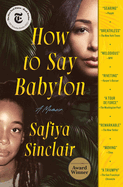
Poet Safiya Sinclair (Cannibal) once again dazzles readers with her memoir How to Say Babylon, flavored as much by the shimmering promise of the future as it is a backward gaze at the author's history.
The eldest of four, Sinclair was born in Montego Bay, Jamaica, and raised by Djani, a fervent Rasta musician from the countryside, and Esther, his ethereal, intelligent wife. Her parents both had "shoulder-length natty Congo Bongo dreadlocks" and started their family while living at Esther's childhood seaside home. Sinclair's father, with his magnetic personality and beautiful voice, was the troubled root of their family. He had become no different than the systemic powers that he railed against: imposing through violence and verbal abuse his own absolute rule over them, forcibly shielding them from the wiles of "Babylon"--Western society and culture--which he considered dangerous and corrupt.
Sinclair knows that if she wants to forge ahead with a life of her own making, she must first reconcile with the past, and "write the ache into something tangible." A Read with Jenna Today Show Book Club and Indie Next Pick, How to Say Babylon is also a historical drama, shedding light on the rise of an Afrocentric, decentralized Rastafari faith in a Jamaica confused about its post-colonial identity. Readers will marvel at the tenderness that defines the author's approach to her troubled childhood, and the strength with which she embraces a future certain to be gilded by the extraordinary imagery of her poetry. --Shahina Piyarali

